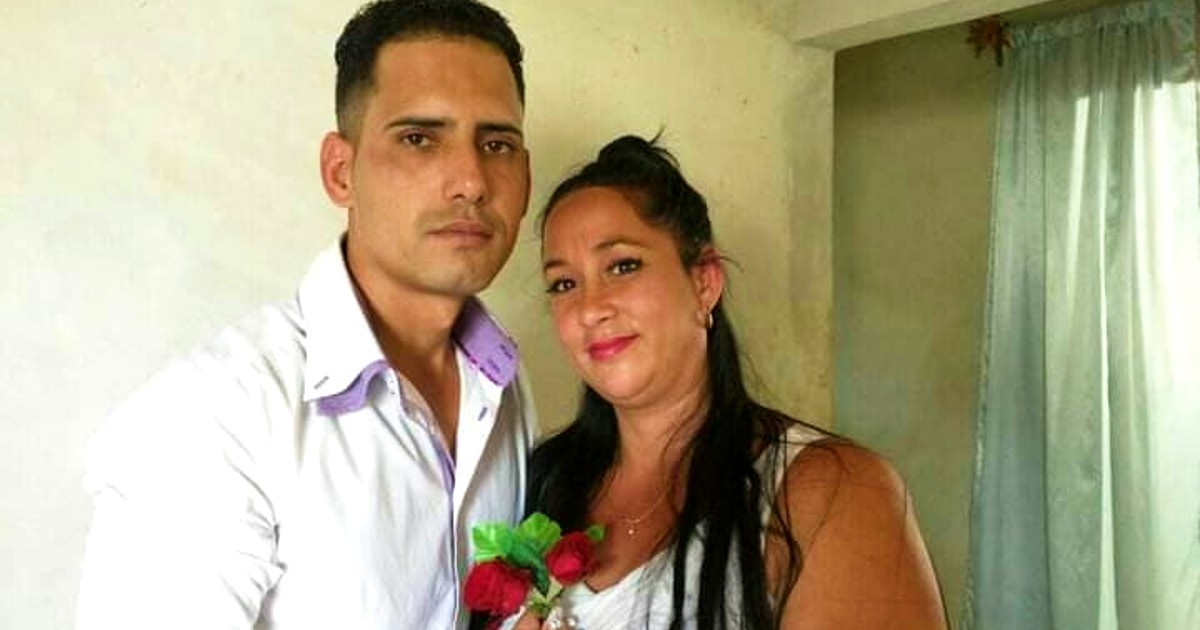
Yosvany Rosell García Caso, a 11J protester who faces a sentence of 15 years in prison for the alleged crime of sedition, denounced the beatings and degrading practices committed by the prison authorities of the prison where he is located.
Blacksmith by trade and father of three children, García Caso (33 years old) is a political prisoner who refuses to wear prisoners' clothes, a fact for which he has been a victim of reprisals in the El Yayal prison, in Holguín.
The last time García Caso was repressed for his position was on September 3, when a medical test he had at the hospital was conditioned on him dressing like a prisoner. Given his refusal, those in charge of the prison refused to take him to a medical appointment.
In a letter sent to his wife, Mailin Sánchez, the 9/11 protester described the pressures, threats and torture he suffers in prison due to his status as a "plantado", by refusing to dress like a common prisoner, being a political prisoner.
“This past July 10, 2022, while confined in the El Yayal prison, the leadership sent two inmates (of whom, for small benefits, they do their jobs as hitmen) to threaten to beat any inmate who dressed in white. on July 10, 11 and 12,” he said.
According to García Caso, he expressed his opposition to the measure and the use of violence and intimidation to enforce it. “Upon hearing the threats [from the chief's hitman prisoners], I told them that I am a political prisoner, and that I would dress in white,” he said in his letter.
“They immediately sent for the guards to show them their servility to the dictatorship. The guards took me to the internal order office, they sent for all my belongings and detained all my clothes. Then they looked for a change of prisoner's clothes and - in a threatening manner - closing the office door with about 10 guards around me, including the lieutenant colonelValerie Gonzales Cabrera, head of the prison, they told me to put on those clothes,” he indicated.
The instruction from the El Yayal leadership intended that the political prisoners who participated inthe historic protests of 11J They did not celebrate the first anniversary of an outbreak that brought tens of thousands of Cubans to the streets of towns and cities. Several complaints on social networks have agreed that this instruction was given in prisons where protesters were among the inmates.
However, the blacksmith from Holguín refused to follow the instructions, claiming that he was not willing to dress like a prisoner in a prison whose prison population is dressed in civilian clothes because the authorities do not provide them with these and other belongings.
“Immediately, upon hearing my response,those 10 henchmen started physical violence against me, applying dislocation techniques, open-hand blows to avoid breaking, hanging and they stood with their boots on top of my head, hands and feet against the floor,” said García Caso.
After beating him and handcuffing him “to the bone,” the repressors put him in a prisoner's uniform and kept his belongings so that he would not have any other spare clothes and would be forced to wear the uniform of those serving sentences for common crimes.
Back in his “company,” García Caso maintained his “rebellious stance” and took off his uniform and threw it outside through the bars of his cell.
"Two hours after that first event, the guards - upon realizing that I was not wearing the clothes they forcibly put on me and that what I was using as clothing was a towel, which was the only thing they left me with - took me out again to the same office, which is more like their torture center and they repeated their vile act to me, reiterating that as long as I refused those clothes they would be beating me every day and would not allow me to have access to family visits or telephone.
This fact was what motivated García Casowent on hunger strike again. The protesterhas resorted on more than one occasion to this extreme form of protest, as a way of demanding that his rights and his status as a political prisoner be respected.
“These actions were repeated for three consecutive days until they took me to the jail cell. After 11 long days, they agreed to give me back my clothes and allow me to dress in civilian clothes,” said the young man who fears that this violent and illegal behavior by the authorities will be repeated.
In that sense, the political prisoner blamed the lieutenant colonel in charge of the El Yayal prison, Valeri Gonzáles Cabrera (“better known as Cuba si”), for anything that could happen to him in prison. “The same by the hands of the guards, as well as by prisoners,” he added, foreseeing the damage that the authorities usually inflict on political prisoners by using common prisoners who agree to behave as hitmen in exchange for small prison benefits.
According to the registry of the organizations Justicia 11J and Cubalex, García Caso is one of the 169 people convicted of the crime of sedition, a charge that the regime's courts used to unfairly punish the 11J protesters and so that the sentences served as a lesson. to the population in the face of future protest demonstrations.
What do you think?
COMMENTFiled in: